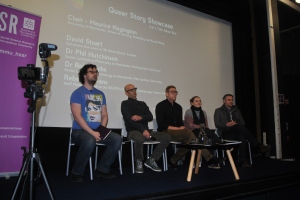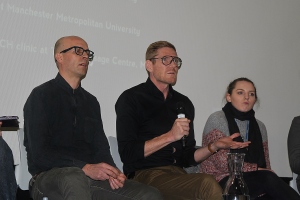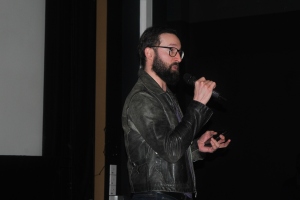Queer Media Festival 2016 is comprised of 3 separate, exciting parts.
Starting on October 31st, there is the MobDoc Workshop (advance tickets available here: MobDoc. Spaces are very limited for this opportunity, so it is highly recommended that you book now. All entrants will have their project screened on November 5th at HOME.
On November 5th, the day is split into two jam-packed halves. The evening event commences at 5PM with the film STRIKE A POSE and culminates in a joyous after-party. Tickets are available here: Strike a Pose
As for the first half of November 5th, we are thrilled to now list the full list of fantastic speakers and screenings. N.B. Participants will be given a wristband to dip in and out of any session.
Meet top industry professionals from BBC, Channel 4 and Gay Star News, VR specialist from Giznode, the Executive Director of UK Black Pride, executive award-winning theatre creators, the artists behind the @Gaybar project and more! Whether you’re just starting out in your career or are looking to make more Queer Media contacts, everyone is very welcome at QueerMedia16. queermedia.org.uk
12PM Welcome by QueerMedia16 Director Jamie Starboisky
12.15PM – 1.45PM
Young Programmers Shorts Selection (the QueerMedia16 young programmers introduce their hand-picked selection of the best LGBTQ+ short films)
Big Time Doodle Diary
S.T.A.R.
Breathe
Little Doll
Passing
2PM – 3.35PM FILM: Jewel’s Catch One (a fascinating documentary about the incredible Jewel Thais-Williams, who broke down racial and cultural barriers while running the oldest Black-owned gay disco in America)
2PM – 2.50PM Live Performance Panel + Q&A. (All panel discussions will take place in the Event Space, Level 2, HOME)
Intro by Sarah Perks (Artistic Director: Visual Art HOME Manchester)
Cheryl Martin (MEN Award-winning theatre director and writer)
Shannon Yee (Award-winning playwright and producer creating work reflecting her life as an immigrant, ethnic minority, queer artist with a disability)
Kate O’Donnell (Legendary Manchester trans performer)
3PM – 3.50PM Future Stories + Q&A
Intro by Tris Reid-Smith (Founder, Gay Star News)
Tim Edwards (VR Specialist & Innovation Director at Giznode)
Zorian Clayton (Transgender Film Programmer for BFI Flare)
Abigail Ward (DJ and co-founder of the online Manchester District Music Archive)
4PM- 4.45PM MobDoc film screenings (Screenings of the 60-second mobile documentaries created during QueerMedia16’s MobDoc workshop. The winner of the first-ever Nelson Sullivan Micro Short Award for best film will be announced. For more info on how to get involved in MobDoc visit skiddle.com/e/12843769)
4PM – 4.50PM Film and Broadcasters Panel + Q&A
Intro by Lady Phyll (Co-founder and Executive Director UK Black Pride)
Jonni Learoyd (Channel 4 HR Project Leader and Co-Chair of Channel 4 Pride)
Rachelle Constant (Head of BFI Vision Award-winning Constant Productions)
Aziz Rashid (Head of BBC North West)
Got your tickets yet? http://homemcr.org/event/queer-media-conference/











